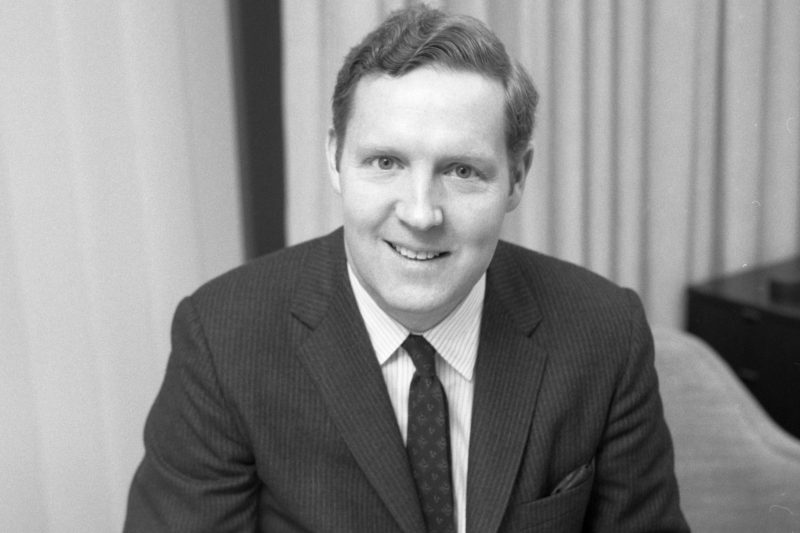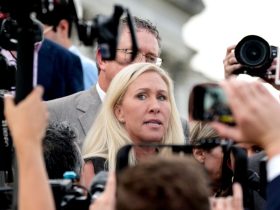Frank Shakespeare, a former CBS executive who deployed his television skills on Richard M. Nixon’s 1968 presidential campaign with a blitz of montage-style ads and on-air events that helped win the White House and underscored TV’s power as a political tool, died Dec. 14 at his home in Deerfield, Wis. He was 97.
The death was confirmed by Ed Feulner, founder of the Heritage Foundation, a conservative Washington think tank, where Mr. Shakespeare served as board chairman from 1981 to 1985. No cause was given.
Mr. Shakespeare’s role as a Republican envoy covered decades, including heading the United States Information Agency while seeking a sharper pro-American edge to its broadcasts and other media. That included “The Silent Majority,” a 1970 news-style propaganda film produced by Mr. Shakespeare’s agency, that asserted widespread American support for the Vietnam War and Nixon’s policies.
Mr. Shakespeare later served as an ambassador to Portugal and the Vatican, acting as a liaison between President Ronald Reagan and Pope John Paul II in discussions over shared opposition to communism.
But Mr. Shakespeare’s most direct stamp on U.S. political sensibilities came during the homestretch of the wrenching 1968 campaign, which played out amid the assassinations of civil rights leader Martin Luther King Jr. and Democratic candidate Robert F. Kennedy. Then came harsh crackdowns on antiwar demonstrators outside the Democratic National Convention in Chicago that August that further rocked the nation.
Mr. Shakespeare was part of a team of media advisers, including future Fox News president Roger Ailes, tasked with remolding Nixon’s image as someone who could rise to the challenges. The former vice president, however, was burdened by his own lack of public finesse and the lingering infamy of his clunky performance in a 1960 televised debate with John F. Kennedy.
The group also grappled with questions that still preoccupy campaigns in the digital age: how best to directly reach voters beyond interviews and rallies? Mr. Shakespeare and his colleagues decided to give Nixon a more neighborly approach.
Nixon voiced-over ads in a conversational style as if talking to a small group — while images of uplifting patriotism or social strife, blamed on Democrats, flicked by on the screen.
Some ads pushed Nixon’s “law and order” platform. “In recent years, crime in this country has grown nine times as fast as population,” Nixon intoned over images of guns and drug use. “I pledge to you,” he concluded, “the wave of crime is not going to be the wave of the future in America.”
Others sought to showcase Nixon’s empathy. To lilting music and snapshots of happy children, Nixon says: “I see the face of a child. What his color is, what is ancestry is, doesn’t matter. What does matter is he’s an American child.”
One ad had just jarring, discordant music over scenes from Vietnam and street riots.
Mr. Shakespeare and Ailes also stage-managed televised town hall-style events in which pre-vetted people posed questions to Nixon. Mr. Shakespeare said at the time that audience applause and reactions helped keep viewers engaged in ways “a quiet interview does not.”
The crowd, he said, “adds luster.”
“This is the beginning of a whole new concept,” Ailes told journalist Joe McGinniss, whose 1969 book, “The Selling of the President 1968,” chronicles the increasingly made-for-television campaign. “This is it. This is the way they’ll be elected forevermore. The next guys up will have to be performers.”
At a time when the Vietnam battles were known as the “living-room war” with nightly reports from the field, Nixon’s 1968 race against his main rival, Democratic vice president Hubert Humphrey, became known as the “living-room campaign.”
“We wanted a program concept of what Richard M. Nixon is in a way in which the public could make its own judgment,” Mr. Shakespeare told the New York Times in 1968. “We wanted to try to create electronically what would happen if five or six people sat in a living room with him and got to know him.”
Mr. Shakespeare led a team whose core members, McGinniss wrote, “knew television as a weapon”: advertising executive Harry W. Treleaven Jr., who was fresh off the successful campaign of a Texas GOP congressman named George H.W. Bush; lawyer Leonard Garment, who would become a Nixon adviser, and producer Ailes. (Ailes resigned from Fox in 2016 amid allegations of sexual harassment and died the following year.)
Mr. Shakespeare’s attention covered even small details. He tweaked the lighting at televised events, had suggestions on Nixon’s wardrobe and made sure the pro-Nixon signs at an October 1968 gathering were all hand-lettered to show apparent grass roots support. “Nixon is groovy,” one read.
After taking the helm in 1969 at the United States Information Agency — which was responsible for global “public diplomacy” through media and other outreach — Mr. Shakespeare quickly gained a reputation as a willing fighter in what is known now as the political culture wars.
He ordered libraries under the agency’s control to boost their collections of conservative-leaning material. A Lisbon site once counted the volumes of William F. Buckley Jr. books compared with those of economist and Democratic stalwart John Kenneth Galbraith.
In a public spat over funding for the agency, Mr. Shakespeare called Sen. J. William Fulbright (D.-Ark.), chairman of the Senate Foreign Relations Committee, “bad news for America.” Mr. Fulbright retorted that Mr. Shakespeare was “a very inadequate man for his job.”
Mr. Shakespeare even became a punchline for a 1970 political cartoon on “The Silent Majority” film and its claims.
“It’s a Shakespeare production — you’ve heard of him,” a man says.
“Sure,” said a woman, “he wrote, ‘A tale told by an idiot, full of sound and fury, signifying nothing.’”
“No!” the man says, “William wrote that … this is Frank Shakespeare, who was Nixon’s television campaign adviser.”
Frank Joseph Shakespeare Jr. was born in New York City on April 9, 1925, and served in the Navy before graduating from the College of the Holy Cross in Worcester, Mass., in 1946.
He found his way into television through radio stations, where he worked as an advertising salesman. He was general manager of a CBS affiliate in Milwaukee for two years before being named vice president and general manager of New York’s WCBS-TV, the network’s flagship station, in 1959.
He was taken under the wing of James T. Aubrey Jr., the network chief known as “the smiling cobra” for his cutthroat reputation. (Aubrey was fired in 1965 amid questions over possible kickbacks on program pitches and later oversaw a major sell-off of assets at Metro-Goldwyn-Mayer studios.)
In 1965, Mr. Shakespeare was appointed to the No. 2 job at CBS as executive vice president, but was moved to other executive roles after Aubrey’s departure. Mr. Shakespeare took a leave to join the Nixon campaign.
After the United States Intelligence Agency, Mr. Shakespeare returned to television with Westinghouse’s broadcast operations and as head of RKO’s radio and television stations. In 1981, he was named by Reagan to oversee Radio Free Europe and Radio Liberty.
He served as ambassador to Portugal from 1985 to 1986 and to the Holy See from 1987 to 1989.
Mr. Shakespeare, who was divorced, is survived by a son and two daughters.
Even before Nixon’s 1969 inauguration, Mr. Shakespeare persuaded the president-elect to do another show — unveiling all his Cabinet choices in a 10 p.m. broadcast rather than announcing them one by one. It makes for better TV, Mr. Shakespeare told him.








